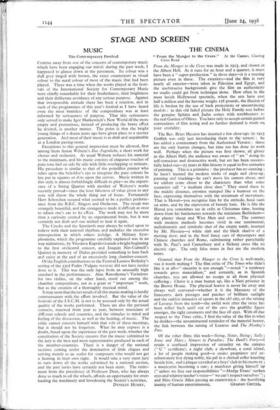THE CINEMA
" From the Manger to the Cross." At the Cameo, Chariog Cross Road
From the Manger to the Cross was made in 1913, and shown at the Albert Hall. As it runs for an hour and a quarter, it must have been a " super-production " in those days—it is a rousing picture even in these. The exteriors—and the film is very nearly all exterior—were taken in Palestine and Egypt, and the unobtrusive backgrounds give the film an authenticity no studio could get from technique alone. How often in the most lavish Hollywood spectacle, when the sets have cost half a million and the heroine weighs 128 pounds, the illusion of life is broken by the use of back projections or unconvincing models : in this old faded picture the Holy Family rest before the genuine Sphinx and Judas comes with torchbearers to the real Garden of Olives. You have only to accept certain period conventions of film acting and no further demand is made on your credulity.
The Rev. Brian Hession has inserted a few close-ups (in 1913 Griffith was only just introducing them to the screen) : he has added a commentary from the Authorised Version : those are the only human changes, but time too has done its work well. Perhaps when the picture was first shown, all glossy in the Albert Hall, the audience was aware of " art " doing its self-conscious and destructive work, but art has been success- fully faded out-25 years in film history is equal to five centuries of painting. This is a primitive : the producer has no cunning ; he hasn't learned the modern tricks of angle and close-up, panning and trucking—he can't move his camera about, and we seldom come closer to the characters than what some scenarists call " a medium close shot." They stand there in the middle distance, emotion stamped like a humour on the face, expressing themselves with the minimum of movement. That is Herod—you recognise him by the attitude, head sunk on arms, and by the expression of broody hate. He is like the Herod you sometimes see in cribs at Christmas time, leaning down from his battlements towards the miniature Bethlehem— the plaster sheep and Wise Men and cows. The contrast with modern methods becomes vivid in one sentimental, melodramatic and symbolic shot of the empty tomb, inserted by Mr. Hession—a white slab and the black shadow of a moving door, and in the final fancy cuts of skyscrapers and Chinese churches and Rome, culminating rather parochially with St. Paul's and Canterbury and a flickery cross like an electric sign. The only false notes in fact are the modern notes.
Granted that From the Manger to the Cross is well-made, was it worth making ? The film critic of The Times who didn't like it at all—" sincerity is not enough "—noted " a tendency towards gross materialism," and certainly, as in Spanish churches, you are allowed no escape at all from physical suffering ; Christ is a man beaten up, like a Nazi prisoner in the Brown House. The physical horror is never far away and always well conveyed—whether it is the Massacre of the Innocents, dark passages and patches of brilliant sunlight and the sudden intrusion of spears in the old city, or the raising of Lazarus from the tomb—the awful wait after the stone has been rolled back until out of the cave the grublike figure emerges, the tight cerements and the face all eyes. With all due respect to the Times critic, I find the value of the film in what he dislikes—the unsentimental reminder of the material horror, the link between the raising of Lazarus and The Monkey's Paw.
Of the other films this week—Swing, Sister, Swing; Sally; Irene and Mary ; Sinners in Paradise; The Devil's Party—I retain a confused impression of carnality on the campus (" U " certificate), a night club, a showboat, a coral island, a lot of people making good—a casino proprietor and ex- reformatory toy dying nobly, his pal in a clerical collar kneeling beside him, and a plaque unveiled at a boys' club in his memory ; a manicurist becoming a star ; a murderer giving himself up (" unless we face our responsibilities "—Madge Evans' sunken eyes and whimsy teacher's voice—" we can't respect ourselves ") ; and Miss Gracie Allen passing an examination : the horrifying inanity of human entertainment. GRAHAM GREE,NE.














































 Previous page
Previous page